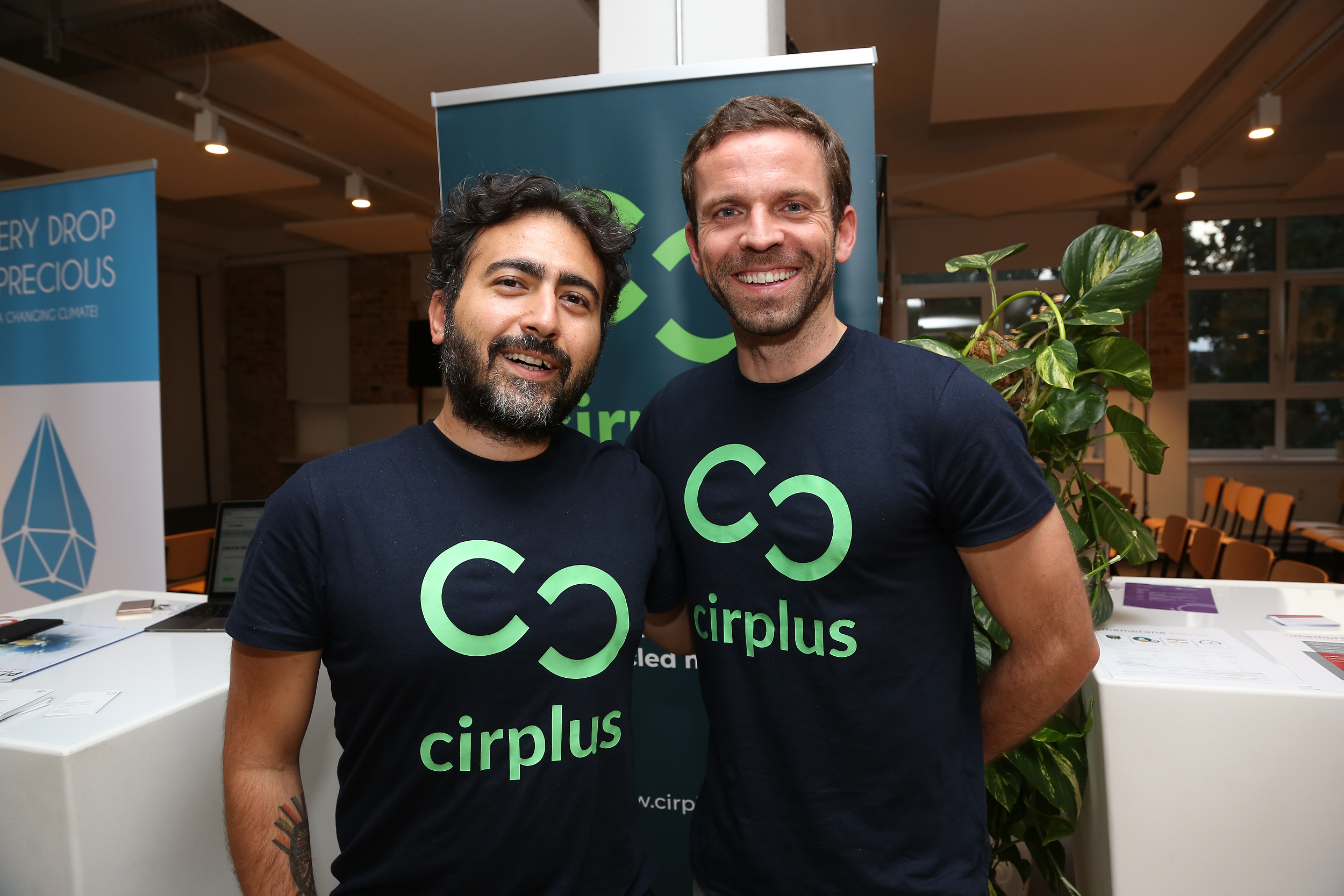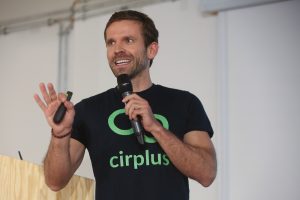 “400,000,000 tons of plastic are produced every year from crude oil, and the trend is rising.” The first thing Christian Schiller says when he enters the stage of the EIT Climate-KIC Demo Day 2019 for his company pitch is shocking. Of course: we know that the world has a huge garbage problem, at the latest since the frightening pictures of sandy beaches buried under plastic, kilometre-long garbage carpets on the oceans or small heaps of plastic waste recovered from the stomachs of sea dwellers. But 400,000,000 tons of new plastic? Isn’t there much more recycling?
“400,000,000 tons of plastic are produced every year from crude oil, and the trend is rising.” The first thing Christian Schiller says when he enters the stage of the EIT Climate-KIC Demo Day 2019 for his company pitch is shocking. Of course: we know that the world has a huge garbage problem, at the latest since the frightening pictures of sandy beaches buried under plastic, kilometre-long garbage carpets on the oceans or small heaps of plastic waste recovered from the stomachs of sea dwellers. But 400,000,000 tons of new plastic? Isn’t there much more recycling?
“No,” say Christian Schiller and Volkan Bilici, the founders of cirplus. “Recycled is only a small part. But at least ten million of the 400,000,000 tons of plastic end up in the ocean every year.

Christian Schiller himself associates this with a life-changing experience: when he was dangling with his legs in the water on a sailing trip between Colombia and Panama, something touched his foot. At first he was frightened because he thought it was a shark. In front of him, however, was a huge carpet of rubbish. When he saw it, he could no longer look away. Back in Germany he therefore began to set something in motion. In the interview he told us what exactly.
Christian, what does Cirplus mean – and what is your vision of the future?
Our name is composed of the English words “circular” and “surplus”. This play on words reflects our vision: to close the plastic cycle one hundred percent by building a global B2B marketplace for recycled plastics. This will make the purchase and distribution of recycled plastics as easy as possible by linking the plastics processing industry with the waste management industry. We founded in December, our first prototype was launched in April 2019.
Can’t companies just buy plastic waste somewhere – and that’s it?
That’s what the industry wants, but it’s not that simple. So far, not much recycled plastic has been purchased from the packaging industry, so there is no real network. Until recently, the use of recycled plastic was not required by law – and it is simply too expensive. New plastic from petroleum is cheaper and of higher quality. Recycled plastic is more expensive because it first has to be collected, sorted and processed. At the same time, the quality is poorer. So for buyers of companies, the bill is: do I buy inexpensive new plastic of high quality or more environmentally friendly recyclate, which is more expensive and has a lower quality?
But this bill is no longer quite right for buyers …
Exactly, because there has been a new packaging law in Germany since the beginning of the year. The aim of this is to lower the price of recycled plastics – and at the same time make it more expensive to use virgin plastic. The law is aimed at the packaging industry, which buys by far the most plastic every year. Nearly 40 percent of the plastic required in the European Union comes from the packaging sector.
What is the new Packaging Act about?
The law sets three levers for the packaging industry to move away from Virgin Plastic and recycle more. To achieve this, recyclate must become cheaper. The first measure is that the law will increase the required recycling rate. Since this year, companies have to prove that at least 58.5 percent of their plastic packaging is recycled, from 2021 even 63 percent. Background: More recycled plastic in the cycle brings the price down.
The second measure: Companies must ensure that the plastic they use is easy to recycle. This makes the recyclate cheaper because it is easier to process. Quality is also improved if pure plastic is used and not so much is mixed. Companies are therefore forced to think of their packaging in terms of recyclability, no longer just in terms of marketing.
And the third measure?
The law obliges companies to use a certain amount of recyclate in their packaging. The second and third measures – i.e. recyclability and the proportion of recycled material – are also controlled by a bonus-malus system. Companies pay a disposal fee. In the future, this will depend on how much recycled material a company uses and how recyclable its packaging is. This compensates for the price differential between recyclate and Virgin Plastic, so that every buyer must recognize: “Okay, the new plastic is cheaper, but it will be more expensive to dispose of again”.
So in the future, companies will increasingly buy recycled material?
Exactly. But they don’t know where and how. This is where we come in. Until now, plastics have simply been purchased from chemical companies by the packaging industry. Now they need a network in the waste management industry. And this is one of the least digitized industries ever. Even less than the plastics industry itself. In addition, the recycling industry is also characterized by high fragmentation. So we are providing a platform that links everyone together – the waste producer with the recycler, the recycler with the buyer and so on.
Why is this so important to you?
For me, it is clearly the experience of having seen the garbage carpet on the ocean with my own eyes. I asked myself: How can it be that we spend trillions to get oil out of the ground – and in the end much of it ends up back in the ocean as packaging? Something is not right. And above all: That doesn’t happen with glass or metal. Nobody throws metal away. Why? Because the material has a higher value. And value is created by generating demand. This is to be achieved with the new packaging law.
How did EIT Climate-KIC help you with your idea?
In many ways. We have free office space – and the coaching we get here is great. We’ve learned how to position ourselves as founders, how to talk about conflicts in a team, and how to think today about what kind of company we want to be in the future. Thanks to EIT Climate-KIC, we are much better networked, not least with impact investors.
What are your biggest challenges at the moment?
The biggest challenge is to get the whole machine up and running. The plastics, waste and recycling industries are like dinosaurs. We have to convince the representatives of these branches of industry of the added value that a digital tool can bring in the future. And we have to convince them to actively help us build the software, because only they have the necessary insights into the industry.
That’s a difficult part of the road, but then everything becomes easier for every industry: If you’re looking for recyclate, enter the type of plastic and the quantity in our search. If you have recyclate to offer, all you have to do is type it in. We then network them all together. In this way, we can exploit the full potential of the Circular Economy and lay the foundation for our vision: a 100% closed plastic cycle.
For more success stories, visit www.climate-kic.org/news-insights.

